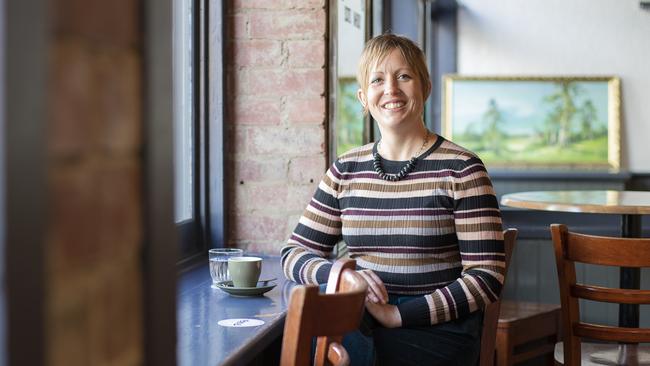Tasmania poised to show world the value of our way of life
Jess Robbins has spent years studying and supporting island life around the world; now she is home to help sustainable Tassie shine on the world stage

Tasmania
Don't miss out on the headlines from Tasmania. Followed categories will be added to My News.
TASMANIA is in prime position to show the world what a sustainable and resilient economy looks like, says international expert on islands, Jess Robbins.
Our success, though, depends on establishing and meeting clear targets in the next decade.
On Monday, Jess is co-ordinating a food and waste forum in Hobart which she hopes will inform one of those targets.
The brainstorm gathering is an initiative of The Tasmanian Way, a new statewide group focused on supporting future prosperity underpinned by strong social and environmental commitments.
“Tasmania is in an excellent position to become a global example at a scale that will strengthen Tasmania’s brand and international profile,” says Jess.
“In turn, that identity can attract the sort of investment and partnerships that add value to our way of life.”
MORE CAFE SOCIETY:
ANDREA SENIOR: MORE SUPPORT FOR TASSIE FOSTER CARERS
HARVEY LENNON: WHY WE NEED TO WALK TO WORK MORE
JENNY DODD: TRAINING THE WORKFORCE OF THE FUTURE
ALISON STONE: VISION TO REMOVE CLASSROOM WALLS
MARGO ADLER: CITY SHOWS IT IS STREETS AHEAD IN SCIENCE
A senior adviser of the Global Island Partnership, Tasmanian Jess spent eight years in New York as partnerships manager for the not-for-profit group dedicated to supporting islands to become global sustainability leaders.
She realised then that while Tasmania was vaguely known as a beautiful, mystical, faraway place, it was unrecognised for its sustainability credentials.
“Coming back to Tassie three years ago, I wondered how it was that no one knew Tasmania was already killing it on so many fronts,” she says over lunch at Tom McHugo’s Hobart Hotel, a traditional pub with a “woke” kitchen dedicated to sustainable practices.
“We are about 90 per cent renewable energy, almost half our terrestrial area is protected and we have a moratorium on genetically modified crops — and those measures are globally significant.
“There are only a handful of economies in the world that are even in the realm of 90 per cent renewable energy, and we can achieve 100 per cent.”
So how do we become more visible on the global scene and reap the benefits?
Jess says there is plenty of work to do between now and 2030, the United Nation’s target year for its 17 Sustainable Development Goals.
“Tasmania can learn from what others — including other islands — are doing around the world to help us sharpen our own ambitious targets as our commitment to action,” says Jess.
She points to Hawaii’s Aloha+ Challenge, a Hawaii Green Growth initiative, as a great model from which to draw inspiration. Its six sustainability targets, many of which relate to climate change somehow, include a goal to at least double the proportion of locally grown food consumed and to reduce pre-disposal solid waste by 70 per cent.
The Shaping Our Food and Waste Systems Forum Jess is running with its 50 invited participants at Parliament House on Monday will be a chance to identify our goals.
The session, hosted by Eat Well Tasmania and the Local Government Association of Tasmania, will be opened by a senior government minister and Lord Mayor Anna Reynolds, who presides over a City of Hobart already committed to a Zero Waste [to landfill] by 2030 management plan.
“We are an island with a lot of waste and it’s time to talk,” says Jess.
“We have fantastic people and a great capacity for change, so how about we put our heads together.
“We need to think broadly about it. With food, it’s not ‘take, make, waste’. What we want is ‘make, consume and enrich’.”
The forum will enable a focused conversation about ways we can transform the state’s food and waste system into a circular economy that does not depend on environmental wreckage for growth, and that is designed to take all needless waste out of the picture.
The current level of food waste in the state is staggering, says Jess, citing on-farm losses of up to 31 per cent for some crops; 2.2 million tonnes of food waste by the commercial and industrial sectors; and $2000-$3800 food waste cost draining from every household annually. As well, food and garden organics account for more than one-third of municipal waste.
“This is about all of us saying we could double the consumption of food that is grown and eaten locally,” says Jess. “And that means thinking about how we can provide better access to local seasonal affordable food.
“In some lower socio-economic areas, there are food deserts where it’s cheaper to buy imported food than to eat local.
“How do we shape change by thinking about what we want and need for our kids and ourselves?
“What we do have already are many examples of initiative that are already working well in Tasmania, and the 24 Carrot Gardens program [a social enterprise run by Mona] is one such example.
“We have great thinkers and innovators – how do we continue and scale up the good things we are doing with food?”
One thing’s certain, she says with a laugh as we finish lunch and drain our wine glasses.
“I don’t want to eat imported grapes.”
Tom McHugo’s Hobart Hotel
The fomer Montgomery’s Hotel is quite the Hobart gastro pub these days, with many regulars rating the chefs for their ingenious ways with humble vegetables and commitment to sustainable and waste-free cooking. A good example is the beetroots we order, which were braised in a pork master stock and served with pork belly and pickled garlic, $12. Unusual starters include beef jerky, $8.
■ Open: Weekdays 11.30am-10pm, Saturday noon-10pm
■ Address: 87 Macquarie St, Hobart
■ Sweet treat: Malt pie, $10


